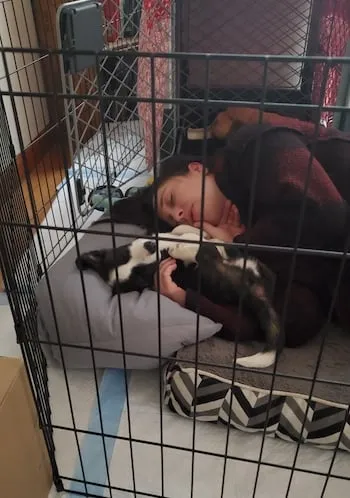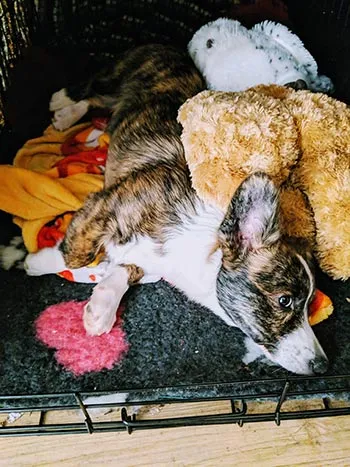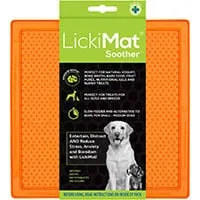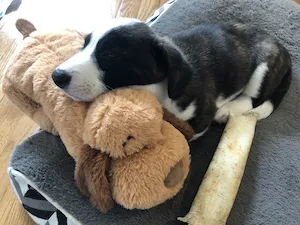Bringing a new puppy home is an exciting time, but it can also be a little exhausting, especially when those adorable little bundles of fur refuse to sleep through the night. If you’re finding yourself bleary-eyed and wondering when you’ll ever get a full night’s sleep again, you’re not alone. Many new puppy parents struggle with this. Fortunately, there are several proven tricks to get your puppy to sleep through the night, and we’re here to share them with you. Just like human babies, puppies require extra attention and management as they grow. Instead of diaper changes, your pup will need nighttime potty breaks until they are mature enough to hold it the whole night.
This comprehensive guide will walk you through establishing a successful sleep routine for your new puppy. We’ll cover everything from evening routines and nighttime potty breaks to creating a comfortable sleep environment. We’ll also address common concerns like why your puppy won’t sleep and where they should sleep so everyone can get a good night’s rest.
Why Your Puppy Isn’t Sleeping Through the Night: Understanding the Reasons
Before diving into the solutions, it’s essential to understand why your puppy might be struggling to sleep through the night. Here are a few common reasons:
- Missing Their Littermates and Mother: Puppies are used to sleeping in a pile with their littermates and mother, providing warmth, security, and comfort. Being alone in a new environment can trigger separation anxiety.
- New and Unfamiliar Surroundings: Everything is new! New smells, new sounds, and a completely different environment can be overwhelming or overstimulating.
- Small Bladders: Young puppies have tiny bladders and can’t physically hold it all night.
- Adjustment Period: Your puppy’s adjustment period, comfort level, and biological needs all play a role. Some puppies adjust quickly, while others take more time.
 French Bulldog puppy sleeping in owners arms
French Bulldog puppy sleeping in owners arms
When Do Puppies Start Sleeping Through the Night? Setting Realistic Expectations
Most puppies are physically capable of sleeping through the night by the time they’re around 4 months (16 weeks) old. However, with consistent training and a proactive approach, you might be able to achieve this sooner.
Remember, every puppy is different, and some may need more time than others. Patience, compassion, and consistency are key to helping your puppy adjust and settle into a nighttime routine.
 Fozzie and Cathy early morning
Fozzie and Cathy early morning
Where Should Your Puppy Sleep? Creating a Safe and Comfortable Space
While the idea of snuggling with your puppy in bed might be tempting, starting them off in a crate is generally the best approach. Crate training provides a safe, secure den-like space for your puppy and offers several long-term benefits, including easier potty training and reduced anxiety. However, there are ways to help them sleep through the night without using a crate, which I’ll explain further below.
Whether you put their crate in your bedroom or in a separate room is a personal decision. Consider what will make both you and your puppy feel most comfortable and secure.
Creating a Comforting Crate Space: The Key to Sound Sleep
The type of crate you choose and how you set it up can significantly impact your puppy’s ability to fall and stay asleep.
Use a Crate Cover: Creating a Dark and Cozy Environment
Just like humans, a puppy’s sleep-wake cycles are influenced by melatonin, a hormone affected by light exposure. Darkness promotes melatonin production, which in turn promotes sleep. A crate cover can help block out excess light, especially during long summer days when the sun rises early and sets late. Ensure the room where your puppy sleeps is dark, turning off all lights, including screens from phones and tablets.
If you’re using a wire crate, consider a properly fitted crate cover, which is safer and more effective than using towels or blankets.
However, if your puppy has a habit of pulling the crate cover through the sides and chewing on it, remove the cover entirely to prevent ingestion.
The Co-Sleeper Hack: An Alternative to Crate Training
This training hack, created by Kim Brophey, is a wonderful option for puppies who are struggling in the crate at night or for those who aren’t crate training their puppy. It provides a safe place for your puppy to stay while you sleep and keeps them close to you. Dogs want to sleep close to their family, and this setup allows you to provide comfort when they need it.
Set up a dog bed right next to your bed and tether your puppy to the top leg of the bed on your side with a leash attached to their collar or harness. The leash should only be long enough for your puppy to spread out on their bed.
Make sure there is a bowl of fresh, clean water within your puppy’s reach, and stock their area with safe chew toys. This way they have something appropriate to do if they get bored or need to self-soothe.
If your puppy starts whining or can’t settle down, provide them some reassurance by touching them with your hand and calmly telling them they are doing okay. If they don’t settle within a minute or two, then take them out for a potty break before returning to bed.
Make Sure Your Puppy’s Bedding is Comfortable: Tailoring to Their Preferences
Dogs appreciate a comfortable sleeping space. Some prefer fluffy blankets, while others prefer cool, hard surfaces. Experiment with different bedding options to see what your puppy prefers. A crate pad, a soft blanket, or even just a towel might do the trick.
 cardigan-corgi-puppy-in-crate
cardigan-corgi-puppy-in-crate
If your puppy tends to chew or shred bedding, opt for chew-proof bedding to prevent them from ingesting pieces. For young puppies, choose waterproof or easily washable bedding.
Burn Some Puppy Energy Before Bedtime: Evening Exercise and Enrichment
Ensure your puppy gets plenty of physical and mental stimulation throughout the evening. If they’re simply lounging around while you watch TV, they’re likely to get their ZZZs in early and be wide awake when you’re ready for bed.
Evening Puppy Exercise: Physical Activity to Tire Them Out
Spend 10-20 minutes playing with your puppy a couple of times during the evening. Play a game of tug-of-war or chase a flirt pole.
 Black Lab puppy playing tug with colorful rope toy 350 canva
Black Lab puppy playing tug with colorful rope toy 350 canva
Evening Brain Games and Training: Mental Stimulation for a Calm Puppy
Use the commercials during your evening television shows to practice basic training cues with your puppy. Keep training sessions short and sweet.
Ditch the regular food bowl and use a puzzle feeder for your puppy’s evening meal. These toys engage their brains and help them burn extra energy.
Calming Pre-Bedtime Puppy Activities: Wind-Down Routine
Licking, chewing, and sniffing are calming activities for puppies. Provide opportunities for these activities before bedtime. Use a snuffle mat, freeze their meal in a Toppl toy, or use a licking mat smeared with a bit of peanut butter or wet food.
LickiMat Classic Soother Slow Feeder LickiMat Classic Soother Slow Feeder
LickiMat Classic Soother Slow Feeder
Last-Chance Potty Break!: Ensuring an Empty Bladder
Take your puppy out for a bathroom break as late as possible. Keep this last potty break calm and boring to avoid waking them up.
Consider your puppy’s evening mealtime. Feeding too late can lead to nighttime potty breaks, while feeding too early can cause restlessness due to hunger. Use food puzzles with small portions of food as pre-bedtime enrichment to prevent late-night hunger.
Always provide free access to water, unless your veterinarian advises otherwise. If your puppy is waking up frequently to urinate, consult with your vet to rule out medical issues and discuss whether restricting water access is appropriate.
Give Your Puppy a “Security Blanket”: Comfort and Security
The transition from sleeping with littermates to sleeping alone can be stressful for puppies. A “Snuggle Puppy” can provide much-needed comfort.
This cuddle buddy has a “real-feel” heartbeat and a gentle warmth source, mimicking the presence of their mother and littermates.
SmartPetLove Snuggle Puppy calming snuggle plush toy for puppies
calming snuggle plush toy for puppies
When bringing your puppy home, bring a Snuggle Puppy along and rub it on his mom and littermates. This will help your puppy feel comfortable.
 Fozzie with Snuggle Puppy
Fozzie with Snuggle Puppy
Soothing Scents for Your Puppy: Using Pheromones for Calmness
Dog-appeasing pheromones (DAP) can help your puppy feel secure and calm by mimicking the pheromones their mother emits during nursing.
The ThunderEase pheromone diffuser covers a large space and lasts for 30 days. You can also use a ThunderEase spray on their bedding.
ThunderEase Powered by ADAPTIL Calming Pheromone Diffuser for Dogs ThunderEase Powered by ADAPTIL Calming Pheromone Diffuser for Dogs
ThunderEase Powered by ADAPTIL Calming Pheromone Diffuser for Dogs
Play Calming Sounds: Masking Noise and Promoting Relaxation
Turning on mellow music can help lull your puppy to sleep and mask other sounds that might wake them up. Classical music, soft rock, or reggae can all be effective.
If music is too distracting, use a fan for white noise or a sound machine.
Consistency is Key
Getting your puppy to sleep through the night takes time, patience, and consistency. By implementing these tricks and tailoring them to your puppy’s individual needs, you can create a peaceful and restful sleep environment for both of you. Remember to consult with your veterinarian if you have any concerns about your puppy’s health or behavior. Sweet dreams!
